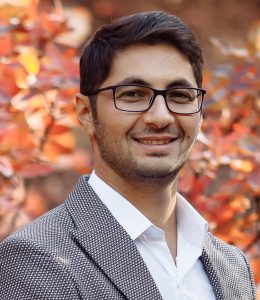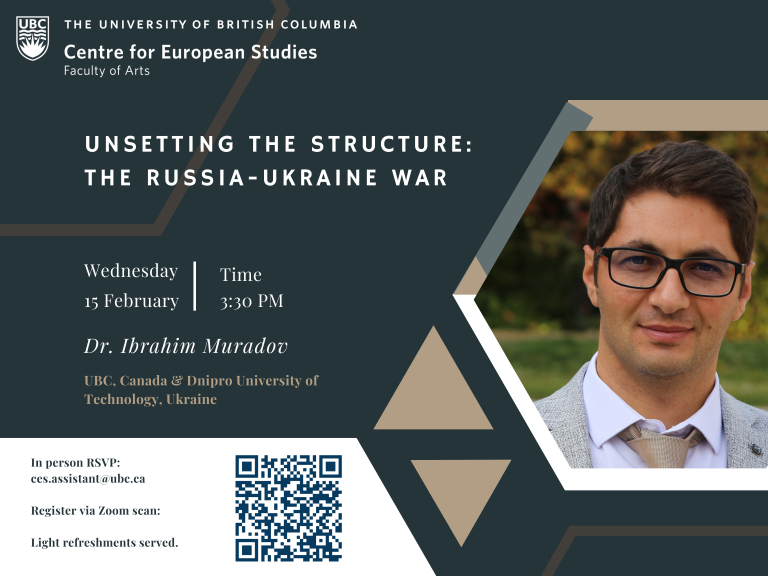
Dr. Ibrahim Muradov, Postdoctoral Research Fellow, UBC and Faculty member in the Department of International Relations and Audit, Dnipro University of Technology, Ukraine
Recording available here.
This event will be held both in person and virtually via Zoom.
Please register for Zoom here.
Please RSVP to ces.assistant@ubc.ca for in person attendance.
Location of the talk is here, Buchanan Tower, Room 997, 1873 East Mall, Vancouver, BC | V6T 1Z1
“Unsetting the Structure: The Russia-Ukraine War”
Bio: Dr. Ibrahim Muradov joined UBC as a postdoctoral research fellow in September 2022. He has been a faculty member in the Department of International Relations and Audit at Dnipro University of Technology since 2020. He received his Ph.D. in International Relations from the Middle East Technical University (Ankara, Turkey) in 2019. His research interests cover armed conflicts in former Soviet republics, particularly Ukraine. Dr. Muradov published a number of articles on the war in Ukraine. One of his most recent publications is titled “Russia’s War Against Ukraine: A Security Dilemma or What”. Besides, he authored two books in 2021: one on Eurasian Studies and another on Conflicts and Peace Studies. As a postdoctoral research fellow, he is also teaching 2 courses regarding Russia’s invasion of Ukraine to third and fourth-year students at UBC. Dr. Muradov has been personally affected by Russia’s unprovoked war against Ukraine and maintains his responsibilities at Dnipro University of Technology (Ukraine) remotely.
Abstract: Among other explanations, geopolitical justifications predominate the literature on why Russia invaded Ukraine. To unpack the driving force behind the war in Ukraine, this reasoning focuses primarily on relations between the West and Russia, ignoring the will of Ukraine. This research aims to comprehend the war inductively by revealing Ukraine’s agency. It contends that the current international structure, which is a continuation of the Cold War-era bipolar world order, prevents Ukraine from pursuing independent foreign policy trajectories. In this sense, the West has consistently been reluctant to grant Ukraine direct membership to the EU or NATO, indicating that it recognizes Ukraine as falling under Russian’s sphere of influence. The main focus of this research is on the question of why, despite the constraints of international structure and geopolitics, Kyiv maintained pursuing the pro-Western foreign policy that resulted in Russia’s invasion of Ukraine. To seek the origin of Kyiv’s pro-Western foreign policy, this research explores the internal dynamics of the country. The key finding of the research is that since Ukraine’s independence, its civil society has increasingly driven the Ukrainian government to democratize the country, which ultimately means forming a pro-Western foreign policy. In other words, Ukrainian governments, driving by the will of people, challenged the geopolitical imperatives which led Russia’s invasion of Ukraine (punishment of international structure). However, Ukrainians attempted to unsettle the international structure by fighting back, which, in other terms, means the war on freedom.
